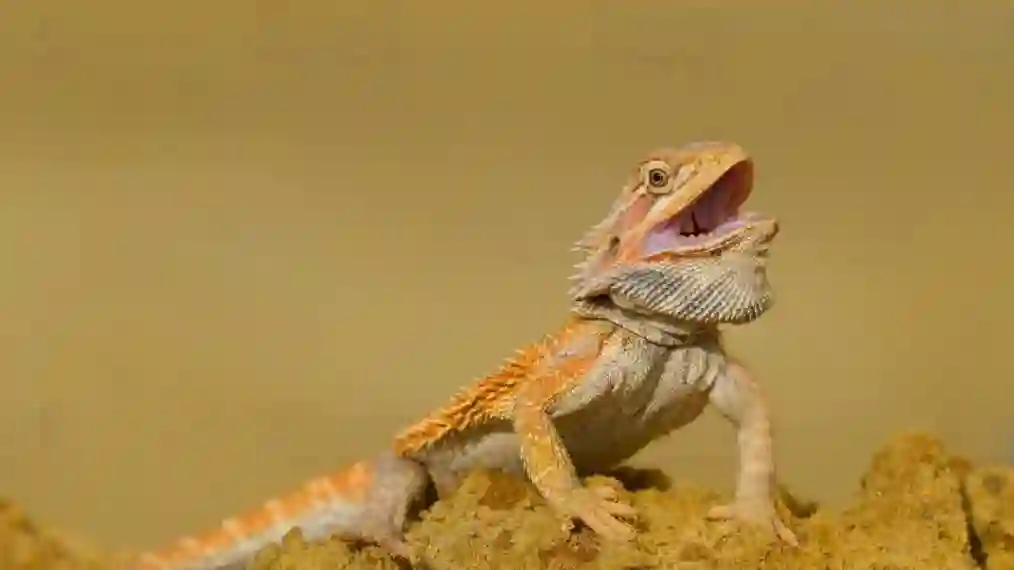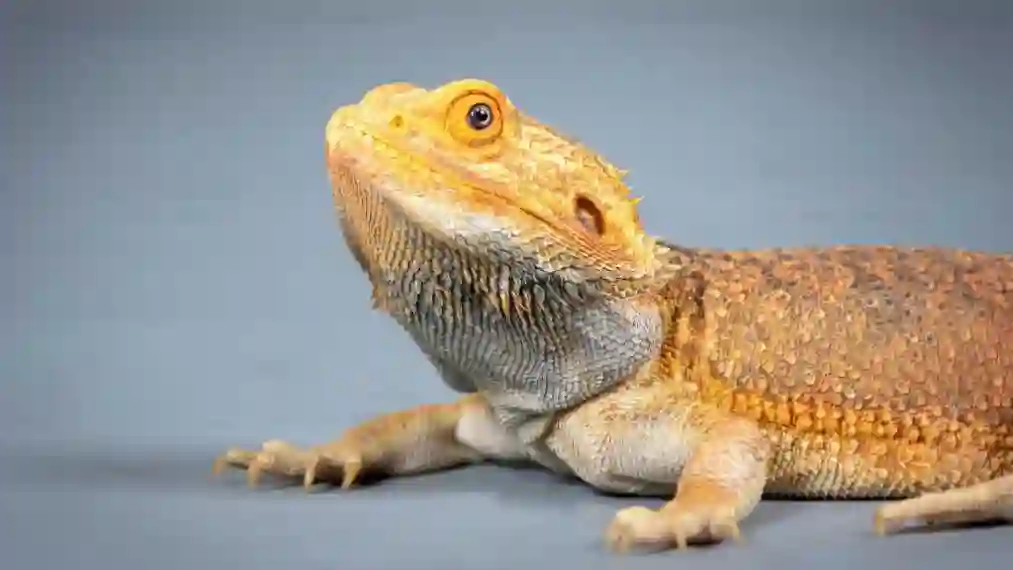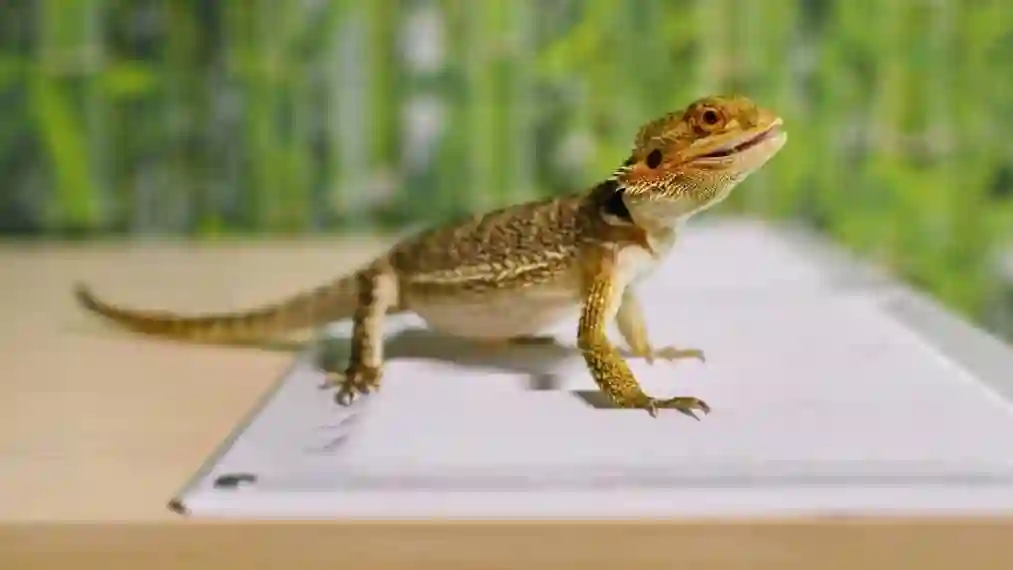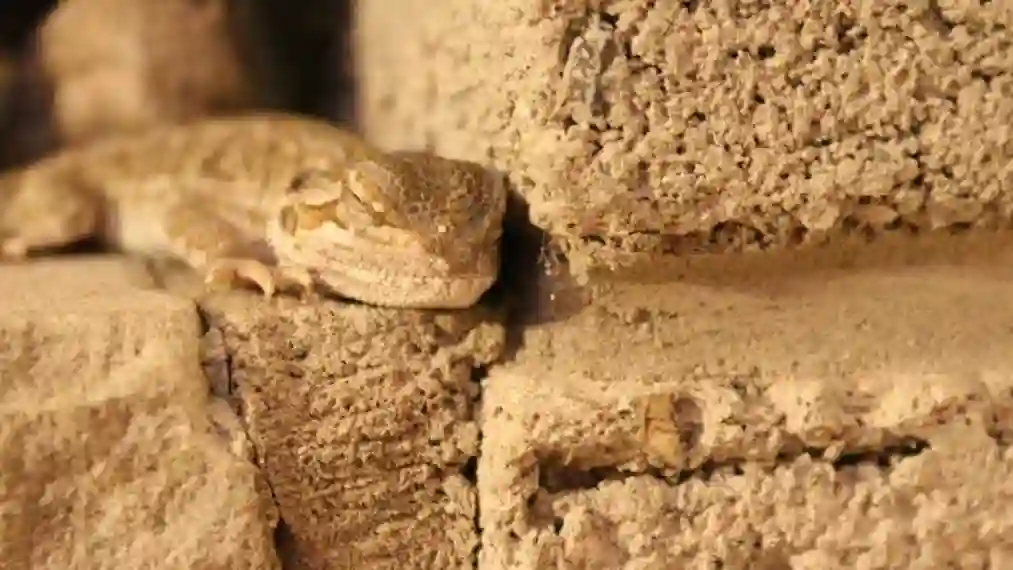Yes, bearded dragons do sleep during the day. Although they are diurnal animals, their sleeping behavior may vary from one bearded dragon to another.
In the day, a bearded dragon may rest on the cool side when it becomes too hot.
Bearded dragons can sleep for 8-10 hours at a time. They cannot sleep with their eyes open, and if they appear unresponsive like they are asleep but have their eyes open, they may be unwell.
However, in some instances, sleeping too much during the day may be indicative of health issues in bearded dragons. For example, if a bearded dragon is sick, it may sleep all day, lose weight, have soft bones, close its eyes most of the time, and have sunken eyes.
Bearded dragons can sleep in any part of their tank at night, as the temperature should be around the same across the whole tank. Without the heating lamp on at night, there should be no “cool side”.
Understanding Bearded Dragons’ Diurnal Nature

Bearded dragons are diurnal creatures, meaning they are active during the day and sleep at night. This trait is a crucial aspect of their biology and has significant implications for their care, including their lighting and heating requirements.
Why Are Bearded Dragons Diurnal?
The diurnal nature of bearded dragons can be attributed to their native habitat in the arid regions of Australia. Being active during the day allows them to bask in the sun, which helps regulate their body temperature and facilitates essential processes such as digestion and vitamin D synthesis.
Bearded Dragons’ Sleep Patterns
When bearded dragons sleep, they often assume a flattened posture, tucking their legs under their body or extending them to the side.
They may close their eyes or exhibit a slight eye bulge, and their breathing may slow down. Some bearded dragons may also change color during sleep, usually becoming darker to conserve heat.
How Long Do Bearded Dragons Sleep?
The duration of sleep for bearded dragons depends on several factors, including age, health, and environmental conditions.
Generally, adult bearded dragons sleep for around 10-12 hours a night, while younger ones may sleep for up to 14 hours. It is essential to maintain a consistent day-night cycle for your bearded dragon to promote healthy sleep patterns.
Factors That Can Affect Bearded Dragons’ Sleep

1. Brumation
Brumation is a period of dormancy that bearded dragons may undergo during colder months, similar to hibernation in mammals. During brumation, bearded dragons may sleep for extended periods and display reduced activity, even during the day. It is crucial to monitor your bearded dragon’s health during this time and adjust its care accordingly.
2. Stress
Stress can disrupt a bearded dragon’s sleep schedule and lead to daytime sleeping. Common stressors include improper lighting and temperature, inadequate hiding spaces, and the presence of other pets. To ensure a stress-free environment, maintain appropriate living conditions and provide ample opportunities for your bearded dragon to retreat and relax.
3. Illness
Illness can also affect a bearded dragon’s sleep patterns, causing them to sleep more during the day. If you notice any unusual behavior or symptoms in your bearded dragon, consult a veterinarian specializing in reptiles for a thorough assessment and treatment plan.
Creating an Optimal Sleeping Environment for Bearded Dragons

1. Provide Proper Lighting
Adequate lighting is crucial for bearded dragons to maintain a healthy sleep-wake cycle. Use a UVB light and a basking light to mimic natural sunlight and establish a consistent day-night cycle. Turn off the lights at night to allow your bearded dragon to sleep undisturbed.
2. Maintain Appropriate Temperatures
Maintain a temperature gradient in your bearded dragon’s enclosure, with a basking spot around 100-110°F (38-43°C) and a cooler area around 80-85°F (27-29°C). Monitor the temperatures regularly and adjust as needed to ensure your bearded dragon’s comfort and well-being.
3. Offer Hiding Spots
Provide your bearded dragon with hiding spots and areas of privacy within its enclosure. These spaces allow them to retreat and feel secure, which can help promote healthy sleep patterns. Hiding spots can be created using rocks, logs, or commercially available reptile hides.
4. Monitor Noise and Activity Levels
Bearded dragons can be sensitive to noise and activity in their environment, which may disrupt their sleep. To create a peaceful atmosphere, keep their enclosure in a quiet area of your home, away from high-traffic zones, and minimize disturbances during their resting hours.
5. Ensure a Clean and Safe Enclosure
A clean and well-maintained enclosure contributes to your bearded dragon’s overall well-being and can positively impact its sleep. Regularly clean and sanitize their habitat, remove any waste and uneaten food, and replace the substrate as needed. Additionally, ensure that all decorations and hides are secure and do not pose a risk to your bearded dragon.
Conclusion
In conclusion, bearded dragons are diurnal reptiles that sleep during the night and are active during the day. Their sleep patterns can be influenced by various factors, including brumation, stress, and illness.
To promote healthy sleep habits, it is essential to provide an optimal sleeping environment, maintain proper lighting and temperatures, and monitor your bearded dragon’s health.
